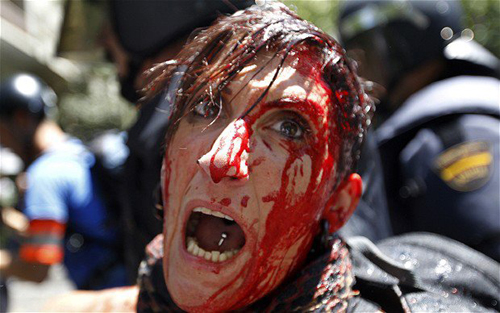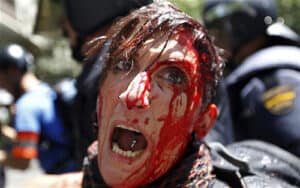A blood-soaked protestor in the anti-austerity protests, Spain 2012
This blog was first written in July 2016 ahead of Derby Theatre’s YPT production of the play. You can watch an interview about that here.
In July 2018 the play will receive its fourth production, as Leeds Actors in Training‘s inaugural production. More details to follow soon…
In October 2011 I was commissioned by children’s theatre the egg in Bath to write a new play with teenagers for their young company.
I knew I wanted to write something political for teenagers to perform: something which explored their own views on patriotism, economics, inequality, disenfranchisement and Great Britain’s relationship with Europe in an imagined near-future.
I had no idea back then just how near that future was, and how prescient the opinions of those 14 – 16 year-olds – then and now still ineligible to vote – would be.
I Am England began as a loose adaption of Shakespeare’s Coriolanus. That story’s backdrop is one where the rich are withholding food from the poor, resulting in huge protests, and the newly-formed leadership is an uneasy two-headed coalition. The wily tribunes – the news mouthpieces of the day – manipulate public opinion purely to score personal points in the political arena. Finally, the eponymous hero is a soldier whom, when finally rewarded with political office, rails against the public for their ignorance and ambivalence and is exiled from the mess he’s left behind.
Our contemporary backdrop was closer to home. We had the beginning of austerity; the formation of a coalition government; the infamous August riots in urban centres and – the blue touch-paper for so much more to come – the aftermath of David Cameron’s much-feted ‘veto’ in September 2011, on an EU treaty seeking to restore economic stability in the Eurozone crisis.
Cameron’s reasoning was the protecting of British interests – so that’s where our exploration began. What did it mean to be British? How eagerly would people defend that label? Was being British also being English? Who even cared? As one young person ambivalently put it, Great Britain was ‘just a rock in the sea.’
Together with the young company, director Sita Calvert-Ennals and sound designer Sam Halmarack, we set about using all of the inspirations above to explore a post-Europe Great Britain; one which had entirely devolved into separately-governed home nations.
We envisioned an economy in total free-fall, public services rationed or ground to a halt, people roaming the streets either unemployed or involved in protest movements, and a manipulative and firmly right-wing Prime Minister who was seeking at any cost to win back the pride of England.
Thinking philosophically, militarily and economically, with one clever marketing campaign this leader would carefully radicalise the next generation of young liberal voters, persuading them with shiny posters that there’s nothing more they’d like to do than ‘blow their brains out for England’.
We looked outside Europe for inspiration too. We knew that Spain and especially Greece were both being hit hard economically. The latter also had the rise of the far right to deal with in the shape of Golden Dawn, as did France with the rise of family Le Pen and the Front National.
It wasn’t long before something brooding and dangerous emerged in the early writing: an amorphous and angry chorus of Englanders, rising in pitch and vitriol through the course of the play, growing from voices in the dark to soldiers in arms and every one of them looking back to a nostalgic past for a sense of consistent identity. The present, for them, no longer felt like a nation they recognised: instead it was a problem too complex for them to solve through words alone.
Back then, theatre’s crystal ball felt like a safe space to explore these issues that lay in the future; but at the time, none of us dreamed it could be so close. Even when the director commented to me ‘you know this is really, really dark, right?’ it still felt like decades away. Even when a public reading halfway through the process touched nerves, and one person thought we were writing a pro-right-wing play, we couldn’t believe it could be interpreted as anything other than a warning – and absolutely not as political dogma.
Reading the script back to myself yesterday evening however, ten days after Brexit, the margin between those opposing interpretations seems to have narrowed to paper-thin. Admittedly the road-map for our backstory had an economic leaning – it was wrapped up in debt defaults and economic pressures rather than a referendum – but the outcome in reality is now threatening to be the same. We might not be at war with Europe, but it is clear our recent message is not being received with favour across the EU.
I Am England gave space to those young people who don’t yet have a voice in our democracy to express their fears and concerns. Many just found it embarrassing that their own nation’s leader asked for special treatment within an organisation committed to strength, peace and prosperity in togetherness – that’s a glib paraphrasing of the EU of course, and it’s by no means a flawless organisation – but that’s how those young people interpreted the move. They have a right to that view. They were fearful of how their country would be seen from the outside: spoiled, arrogant and short-sighted.
They were part of creating a play that imagined themselves into a future England so far from what they wanted, that they felt compelled to warn others what it might look like. They were opening up a platform for provocation and debate.
I Am England is not a knee-jerk Brexit play. It is a play comprised of young people’s political voices that found their power in the early beginnings of Brexit. And in 2016, they’re now speaking to a world where they are expected to bear the strain of the biggest political upheaval in our country for decades for longer than anybody else. They didn’t have a chance to be heard. So please listen to them now. Please hear what they have to say.

